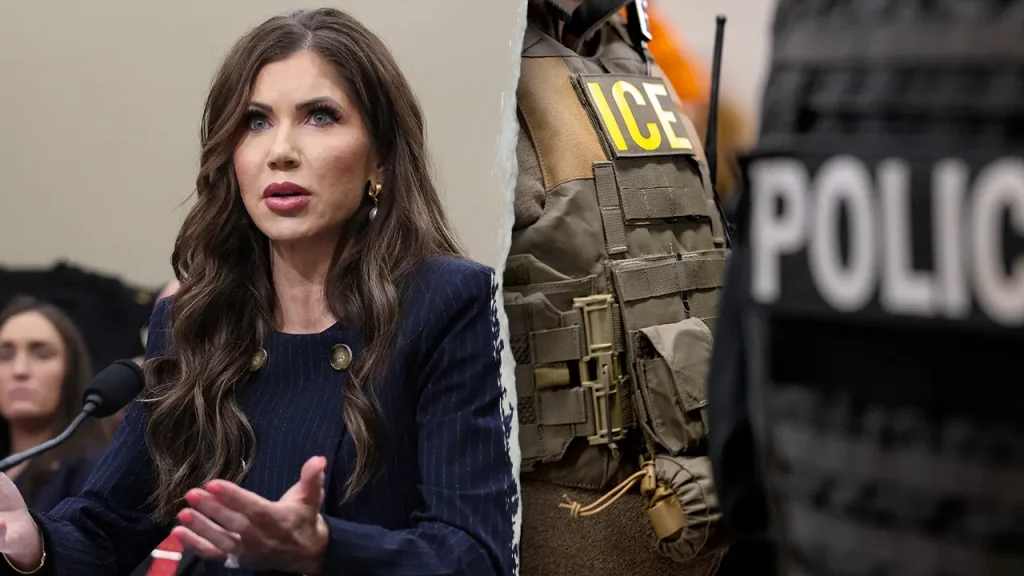Homeland Security Vows Law Enforcement at Super Bowl Amid Bad Bunny Controversy
In a recent interview on “The Benny Show,” Homeland Security Secretary Kristi Noem made firm declarations about immigration enforcement at the upcoming Super Bowl 60 at Levi’s Stadium in California. Her comments came in response to questions about Bad Bunny, the Grammy-winning Puerto Rican artist scheduled to perform at the halftime show, who previously expressed reluctance to tour in the United States due to concerns about Immigration and Customs Enforcement (ICE) raids at his concerts. This has created an unusual tension between the NFL’s entertainment choices and the incoming administration’s immigration enforcement priorities, with Noem emphasizing that authorities would be “all over that place” during the game to ensure both safety and law enforcement.
The controversy deepened when Noem sharply criticized the NFL’s decision to feature Bad Bunny, whose real name is Benito Antonio Martínez Ocasio. When asked about the league’s choice of performer given his public statements about ICE, Noem didn’t mince words, saying, “They suck, and we’ll win.” Her unusually blunt assessment continued as she characterized the NFL as “so weak,” suggesting that the organization lacks conviction in its values while asserting that her administration would “fix it.” This exchange highlights growing tensions between cultural institutions like the NFL and political figures regarding immigration policies and enforcement practices, particularly at high-profile events that attract international attention.
Bad Bunny’s previous comments about ICE have become a flashpoint in this developing situation. The three-time Grammy winner had told i-D magazine that concerns about ICE agents potentially targeting his concerts were a significant factor in his decision not to perform in the United States during his upcoming tour. “But there was the issue of — like, f—ing ICE could be outside [my concert]. And it’s something that we were talking about and very concerned about,” he stated in the interview. These remarks have resurfaced and gained renewed attention following the announcement of his Super Bowl halftime performance, creating what some see as a contradiction between his stated position and his willingness to perform at America’s biggest sporting event.
The situation became even more charged when Trump advisor Corey Lewandowski weighed in earlier in the week, delivering a stark warning that ICE agents would indeed be present at the game. “There is nowhere you can provide safe haven to people who are in this country illegally,” Lewandowski declared on the same show. “Not the Super Bowl and nowhere else. We will find you and apprehend you and put you in a detention facility and deport you.” This explicit threat suggests that the administration views the Super Bowl not just as a sporting and cultural event but as a potential enforcement opportunity, raising questions about whether undocumented immigrants who might attend the game could be targeted for detention and deportation.
Noem’s approach to Super Bowl security reflects broader philosophical differences about immigration enforcement at public events. While acknowledging her responsibility to ensure that “everybody who goes to the Super Bowl has the opportunity to enjoy it and to leave safely,” she also emphasized that those attending should be “law-abiding Americans who love this country.” This framing suggests a particular vision of who belongs at national events and potentially signals a shift toward more aggressive immigration enforcement at large public gatherings. The administration appears to be using the high-profile nature of the Super Bowl to communicate its immigration priorities and enforcement intentions to a national audience.
As the Super Bowl approaches, this situation exemplifies the increasingly complex intersection of sports, entertainment, politics, and immigration policy in America. The NFL, which has often tried to navigate political controversies without alienating segments of its diverse fan base, now finds itself caught between an artist who has expressed concerns about ICE raids and an administration that appears determined to use the event as a platform for demonstrating its immigration enforcement resolve. While Fox News Digital reported reaching out to the NFL for comment, the league’s response—or lack thereof—will be closely watched as it balances the entertainment value of having a globally popular artist perform while addressing the political implications of that choice in the current climate surrounding immigration enforcement.


